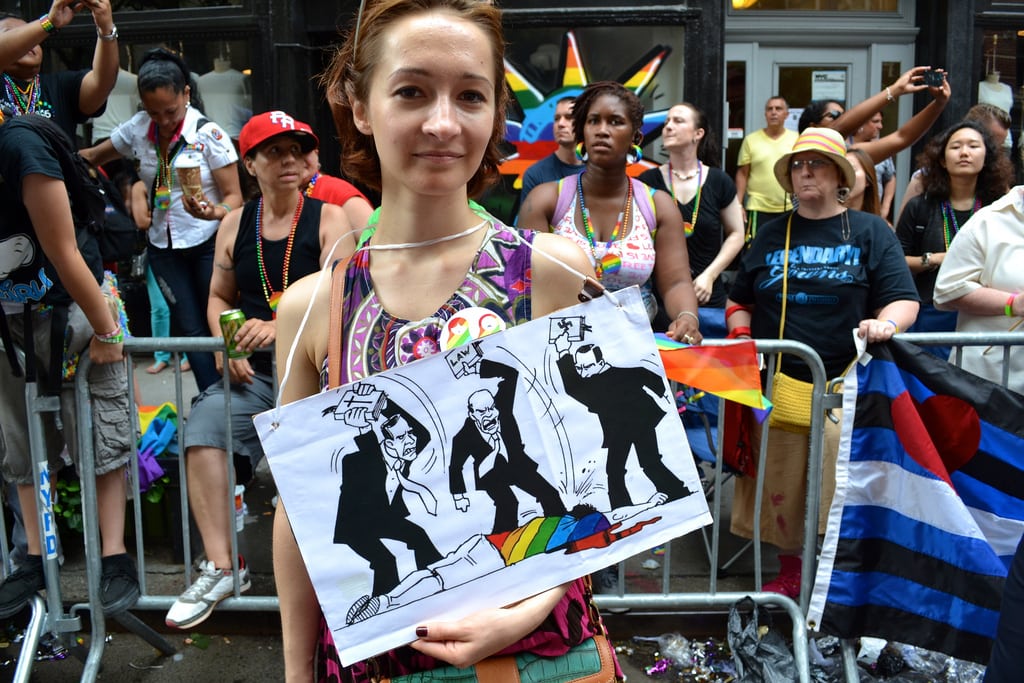Skift Take
This boycott has some growing pains to go through before it becomes a viable movement, but on its way it must be sensitive to the concerns of gay Russians still living in the homeland.
After the passage of a Draconian anti-gay law in Russia, a US-based gay advocacy group is calling for a boycott of the 2014 Winter Olympics, scheduled to be held in the Russian city of Sochi, on the Black Sea.
Rusa LGBT, a Russian-speaking group based in New York City, organized the campaign shortly before this year’s gay pride parade in New York City.
“Do not go to Sochi. Do not support state-sponsored hate and witch hunts. Do not sponsor the Sochi Olympics,” the group implored in a June 21 press release. “Let the Russian government know that the world will not tolerate federally mandated homophobia and persecution.”
One hundred fifty supporters marched with Rusa LGBT at the pride parade June 30, holding signs that read, “Anti-gay laws in Russia force people to leave!’; “Putin, blood on your hands!’; and “7 gays were murdered in 2013!”
But not all advocates support the boycott.
Cyd Zeigler, a gay blogger and the co-founder of Outsports.com, a gay-sports publication, argues that an Olympic boycott would primarily hurt those who deserve it least: the athletes.
“The state of LGBT rights in Russia is disgraceful, but it’s no reason to boycott the Olympic Games,” Zeigler wrote in his Huffington Post blog soon after the boycott was announced. “It’s a good enough reason to petition the president for sanctions on Russia; it’s a great reason to protest in front of the United Nations. But Russian LGBT rights have nothing to do with the athletes who have put in years of sacrifice and hard work to reach their ‘one moment in time.'”
But the group of first-generation Russian immigrants, Russian-Americans, and their families calling for the boycott doesn’t actually aim to deprive athletes of that moment.
“We don’t think we can get as far as for the athletes to not go to the Olympics — and actually that’s not our goal,” Long said. “But maybe they could, while there, speak up on the question of equality.” To make such a statement would, of course, be to risk arrest, since the law that sparked this movement forbids all pro-gay speech in addition to homosexuality itself. However, as Long noted, a national athletic treasure is significantly better protected from detention and deportation than most.
But the group’s motivations may not even matter all that much, given the track record of political boycotts. Professor Michael L. Miller, who has studied political boycotts and was featured last month at a three-day conference on their history, said the strategy lacks power.
“The general consensus is that boycotts are a tool of the weak and powerless, a tool of last resort that never really has the desired effect,” he said in an interview Wednesday. “The effect in the best case scenario is draw attention to the plight of certain people, in this case the gay community in Russia.”
The New York group’s expectations are accordingly tempered. “Realistically, the Olympics are definitely going to take place,” said the group’s co-president Nina Long this week. “What we want to do is to help create the background and the roots for change.”
Specifically, she hopes to inspire some of the Games’ corporate sponsors to withdraw their support, believing that economic pressure is the best route to political influence. “Politics and economy are always tightly related,” she said. “So if we can send our message to one part of this partnership, maybe it will eventually travel to Parliament.”
But just as important – if not more so – is that the boycotters coordinate with the affected community, according to Professor Miller.
“If the ultimate goal is just to draw attention to this, then the question is whether that’s even in the interest of the gay people in Russia,” he said.
Rusa LGBT hasn’t established local partners, but may, as they’re still in the early stages. Miller suggests they waste no time.
“Boycotts are usually not initiated by the people who are affected directly, so there is no personal risk,” he said. But on the ground, there is. “In the case of the Russian Federation, who knows, Putin may punish the local population for a boycott movement outside the country,” he said.
Then again, given the Russian leader’s personality and priorities, this movement is just as likely to go entirely unnoticed. The way it’s looking now, Professor Miller said, “this won’t even be a blip on Putin’s radar screen.”
The Daily Newsletter
Our daily coverage of the global travel industry. Written by editors and analysts from across Skift’s brands.
Have a confidential tip for Skift? Get in touch
Tags: boycott, events, lgbt, olympics, politics, russia, sports
